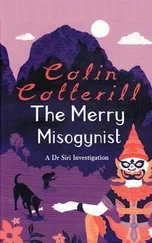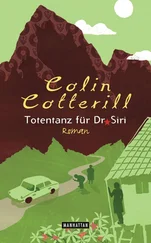Colin Cotterill - The Coroner's lunch
Здесь есть возможность читать онлайн «Colin Cotterill - The Coroner's lunch» весь текст электронной книги совершенно бесплатно (целиком полную версию без сокращений). В некоторых случаях можно слушать аудио, скачать через торрент в формате fb2 и присутствует краткое содержание. Жанр: Криминальный детектив, на английском языке. Описание произведения, (предисловие) а так же отзывы посетителей доступны на портале библиотеки ЛибКат.
- Название:The Coroner's lunch
- Автор:
- Жанр:
- Год:неизвестен
- ISBN:нет данных
- Рейтинг книги:3 / 5. Голосов: 1
-
Избранное:Добавить в избранное
- Отзывы:
-
Ваша оценка:
- 60
- 1
- 2
- 3
- 4
- 5
The Coroner's lunch: краткое содержание, описание и аннотация
Предлагаем к чтению аннотацию, описание, краткое содержание или предисловие (зависит от того, что написал сам автор книги «The Coroner's lunch»). Если вы не нашли необходимую информацию о книге — напишите в комментариях, мы постараемся отыскать её.
The Coroner's lunch — читать онлайн бесплатно полную книгу (весь текст) целиком
Ниже представлен текст книги, разбитый по страницам. Система сохранения места последней прочитанной страницы, позволяет с удобством читать онлайн бесплатно книгу «The Coroner's lunch», без необходимости каждый раз заново искать на чём Вы остановились. Поставьте закладку, и сможете в любой момент перейти на страницу, на которой закончили чтение.
Интервал:
Закладка:
Haeng looked at him like he was lower than dirt. “I think we’ll need to discuss attitude at out next tutorial. Don’t you?”
Siri smiled and resisted making a comment.
“And, Doctor,” the coroner stood with his nose to the door, “why do you suppose the Democratic Republic issues quality black shoes to its government officials free of charge?”
Siri looked down at his ragged brown sandals. “To keep Chinese factories open?”
Judge Haeng lowered his head and moved it from side to side in slow motion. It was a gesture he’d learned from older men, and it didn’t quite suit him.
“We have left the jungle, Comrade. We have escaped from the caves. We now command respect from the masses, and our attire reflects our standing in the new society. Civilized people wear shoes. Our comrades expect it of us. Do you understand what I’m telling you?” He was speaking slowly now, like a nurse to a senile patient.
Siri turned back to him with no sign that he’d been humiliated. “I believe I do, Comrade. But I think if the proletariat are going to kiss my feet, the least I can do is give them a few toes to wrap their lips around.”
He yanked open the sticky door and left.
Siri walked home through the dusty Vientiane streets at the end of a long Friday. He usually kept a cheery smile on his face for anyone who wanted it. But he’d noticed that fewer people returned it these days. The merchants along his route who knew him always had a friendly comment, but strangers were starting to misread his expression. “What does he know, this little man? What does he have to smile about?”
He passed government women at the end of their day jobs. They wore khaki blouses and traditional black phasin that hung stiffly to their ankles. Each managed to make her uniform unique in some way: a brooch, a different collar, a fold in the skirt that was their own.
He passed schoolchildren in scrubbed white shirts and itchy red scarves. They seemed baffled by their day, too confused to giggle or mess around. Siri felt the same.
He passed dark, half-empty shops that all seemed to sell the same things. He passed the fountain whose spouts had become cave dwellings for insects, and unfinished buildings whose bamboo scaffolding was green with ivy.
It took him twenty minutes to walk home: just enough time to get the annoying image of Judge Haeng out of his mind. Siri was staying in an old French two-story house with a small front garden crammed with vegetables. The building needed just about everything: paint, mortar, uncracked glass, tiles, you name it; but it wasn’t likely to get any of them for some time.
As was its way, Saloop lurched out from the cabbages like a crocodile and, even in semi-consciousness, started to howl at Siri. The dog had howled at him and him alone for the entire ten months he’d been there. Nobody could explain what motivated the slovenly creature to pick on the doctor as it did, but there were things going on in that dog’s mind that no human could fathom.
As it did every day, Saloop’s eerie wail inspired a chorus of barks and howls the length of the street and beyond and, as usual, Siri creaked open the front door to the accompaniment of dogs. He could never sneak home unnoticed. Even the staircase betrayed him. Under his footsteps, its groans echoed in the bare hallway and the loose floorboards announced his arrival on the balcony.
Neither the front door nor the door to his room was locked. There was no need. Crime had stopped. His apartment was at the rear overlooking the little Hay Sok temple. He reversed out of his sandals and stepped inside. There was a desk with books waiting for him at the window. A thin mattress was rolled up against one wall under the skirt of a mosquito net. Three peeling vinyl chairs gathered around a tin coffee table, and a small stained sink perched on a thick metal pipe.
The bathroom downstairs was shared with two couples, three kids, and a lady who was the acting head of the teacher training division at the Department of Education. Such were the spoils of a communist victory. But as conditions were no worse than before, nobody complained. He lit the gas on the one-ring range and boiled his kettle of water for coffee. In a way it felt good to be home.
But this was to be a weekend of strange awakenings. On Friday night he sat at his desk reading by oil lamp until the fussing of the moths got too much for him. His bedroll was placed so he could see the moon emerging from behind one cloud, and the next, and the next, until he was hypnotized into a peaceful sleep.
Siri’s dream world had always been bizarre. In his childhood, the images that lurked there constantly interrupted his sleep. The sane woman who raised him would come to his bed and remind him that these were his dreams inside his head, and nobody had more right to be in there than he. He learned how to walk tall through his nightmares and not to be afraid of what happened there.
Although he stopped being scared, he never did gain control of them. He couldn’t keep out unwanted visitors, for one thing. There were a lot of strangers loitering in his dreams with little or no intention of entertaining him. They lurked, laid about, idled, as if Siri’s head was a waiting room. He often felt as if his was just a backstage to someone else’s dreams.
But the most peculiar visitors to his subconscious were the dead. Since that first mortality, the first bullet-ridden man to die on his operating table, all those who’d passed from here to there in front of him had taken the trouble to pay him a visit.
When he was a young doctor, he’d wondered whether he was being punished for not saving them. None of his colleagues shared these hauntings, and a psychologist he once worked with in Vietnam suggested they were merely manifestations of his own guilt. All doctors wonder whether they could have done more for their patients. In Siri’s case, the learned man believed, these doubts came in visual form. Siri was calmed by the fact that in the dreams the departed didn’t seem to blame him; they were just bystanders, watching events with him. He was never threatened by them. The psychologist assured him this was a good sign.
Since Siri had started working as a coroner, coming into contact with the bodies of people he hadn’t known when alive, these visitations had become more profound. He was somehow able to know the feelings and personalities of the departed. It didn’t seem to matter how long it had been since life had drained from the body; his dream world could spiritually reassemble the person. He could have conversations with the completed whole, and get a feeling of the essence of what that person had been in real life.
Of course, Siri hadn’t been able to mention these reconstructions to his friends or colleagues. He didn’t see it would be to anyone’s advantage to admit that he turned into a raving lunatic after dark. His condition did no harm, and it did encourage him to show more respect to cadavers, once he knew the former owners would be back.
With such mysteries going on in Siri’s sleep, it was hardly surprising he often awoke confused. On this particular Saturday morning, he found himself in one of those neither-one-nor-the-other dimensions. He was aware he was in his room and that two of his fingers had been bitten by midges. He heard the dripping of the tap. He could smell the smoke of leaves burning in the temple yard. But he was still dreaming.
On one of the vinyl chairs there was a man. The morning light filtered through the cloth curtain immediately behind his head. From inside the mosquito net, Siri couldn’t make out his face, but there was no mistaking who he was. He had no shirt and his frail torso was blue with old tattooed mantras. He wore a checkered loincloth, below which two leg stubs rested on the seat. The congealed blood matched the vinyl.
Читать дальшеИнтервал:
Закладка:
Похожие книги на «The Coroner's lunch»
Представляем Вашему вниманию похожие книги на «The Coroner's lunch» списком для выбора. Мы отобрали схожую по названию и смыслу литературу в надежде предоставить читателям больше вариантов отыскать новые, интересные, ещё непрочитанные произведения.
Обсуждение, отзывы о книге «The Coroner's lunch» и просто собственные мнения читателей. Оставьте ваши комментарии, напишите, что Вы думаете о произведении, его смысле или главных героях. Укажите что конкретно понравилось, а что нет, и почему Вы так считаете.












